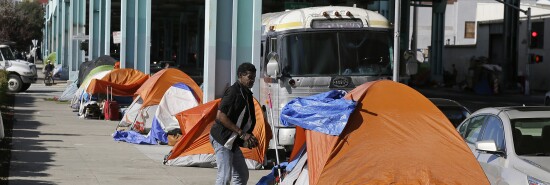
San Diego learns the benefits of addressing homelessness
Zachary Faria
Video Embed
San Diego has discovered that cleaning up homeless encampments makes sidewalks walkable and people safer. Who could have possibly guessed this?
Police have begun enforcing the city’s ban on public camping within two blocks of schools, shelters, trolley stations, waterways, and parks. The locations that have been cleared are now no longer clogged with tents, tarps, and trash. As it turns out, even the threat of cleaning out encampments has led several areas to become cleaner as homeless people moved locations to avoid the hassle.
RENTS ROSE AGAIN IN JULY, PUTTING UPWARD PRESSURE ON INFLATION
There are more lessons to be learned from San Diego’s bold decision to look like a proper, civilized city. Homeless encampments are public health hazards due to the combination of trash, urine, feces, and drugs (occasionally). That is why San Diego is enforcing the ban near parks and waterways. But San Diego police also made several arrests during their sweeps for people with outstanding warrants.
What’s more, San Diego learned that many homeless people are indeed choosing to be homeless. Nobody at the encampment at Balboa Park that was cleared out accepted the offer for shelter, a fact that comes as no surprise to anyone but the few activists who genuinely believe that shelter space is the only issue in the homelessness debate.
As Texas and Georgia have seen, you do not need to funnel money through organizations that “advocate” for homeless people by allowing them to fall further into drug addiction, and you do need to have some enforcement mechanism to get homeless people into diversion programs or shelters. And, as San Diego is now seeing, it also allows your city to become cleaner and safer. Again, who could have guessed?
The “progressive” plan for homelessness, where states such as California spend billions to make no progress and force communities to host drug havens at the expense of their own health and safety, has failed. It is neither empathetic nor successful. San Diego is right to ignore it, and other cities should do the same.
